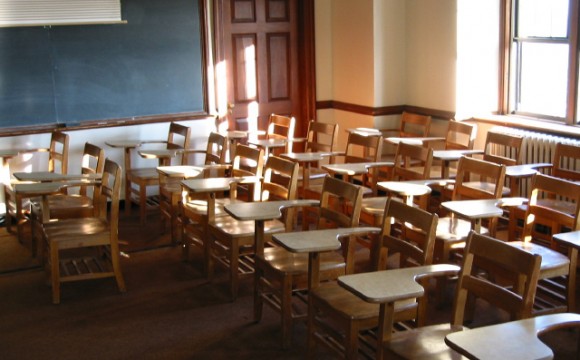Education
Beyond the New Computers and Fancy Buildings, Choosing a Quality School for Your Child

While conducting a seminar for parents on choosing schools for children of all ages, a father of a third grader stood up and shared his family’s story. Having moved several times for employment, he lamented the task he faced trying to locate a quality school for his daughter. With passion and conviction he eloquently shared his vision for the life he wanted for his daughter. This vision was not bound by geography or profession. His vision for his daughter allowed her to circumnavigate the globe with her dreams and live a life of prosperity and comfort. As his mini-sermon came to a close, he said to me—“Doc, help us help our children find a quality school. Without a quality education the cards are stacked against them.”
Noting the concerns of the father, I asked the group what they believed they would see in a quality school. Immediately they began to toss out the relevant data about the number of students labeled as proficient on the state standardized test. The responses were very much linked to the current discourse in public education that has largely centered on evaluating schools based on the results of standardized test scores and the subsequent demonization of teachers working in schools with less than stellar test scores. Certainly, there is some merit in using the data generated by the students’ performance on standardized tests to make certain judgments about the quality of the schooling environment. However, when parents, concerned members of the community, and politicians, utilize this data as the sole marker of determining whether students are receiving a quality education or if a child will have a competent teacher, it is my contention that we are overlooking other critical elements in determining the quality of a school. The question becomes—how should we choose a quality school for children?
Looking beyond the test scores
#1: As the number of charter schools has grown in many urban communities, and open enrollment has become an essential element of schooling in many school districts, attending the school located in the neighborhood we live in has become an anomaly for many families. It is not my intention to debate the merits of charter schools versus public schools nor the merits of open enrollment versus maintaining a community schooling model, but simply to suggest that these new enterprises require a new way of looking at the schools we send our children to. As such, it becomes imperative for parents to visit the school regardless of what the test scores might say. Let the administrators know that you would like to take a tour DURING the school day, and observe the instruction taking place in the classroom. If the students are sitting in rows and not actively engaged in the learning process, you must inquire about this. If the teachers seem to be yelling at all of the kids, ask questions. If the administrator denies you a tour during the school day—find another school for your child.
#2: A recent article in the New York Times highlighted the disproportionate rate at which African American boys are being suspended from schools. While this issue has been discussed in educational research for quite some time, parents have been kept in the dark by schools and school systems on this matter. The big question is—what do you do about this as a parent? Prior to enrolling your child in the school, or even giving a school any consideration, ask the school about their suspension data. Additionally, ask the school how they handle discipline. If their response is—we have zero tolerance for any misbehavior—ask yourself if you are ok with that. Lastly, ensure that you have a clear understanding of the data—make sure they show it to you! If African American boys are 25% of the student population, they have no business being 50% of the students suspended.
#3: What else is here besides reading, writing, & arithmetic: Quality schools always understand that education is far more than what’s taught in the classroom. As parents, we need to inquire about the other skills or dispositions the school is teaching. In other words what programs are being implemented to help students understand more than what’s being tested. Are there after school programs? If so, what is the cost.
#4: If we really want to know what the school is like—ask parents who send their children there. Wait outside of the school before or after school. Don’t just talk to the parents that the school tells you to speak with. Do your own research. And when you are speaking with the parents—ask them the following:
- Is your child happy at this school?
- Do you feel like your child is treated fairly?
- Does your child feel physically and emotionally safe?
- Does the school make you feel welcome as a parent?
- Who are the GREAT teachers? Who are the teachers that teach well but also connect with your child?
As we get ready to begin a new school year, know that parents across the country are struggling just like you and me. Are we sure that our kids are attending the best school? Are we making good choices for them? At the end of the day, WE are their first teachers. WE know them the best. WE love them the most. WE are responsible for finding that quality school—don’t leave any stone unturned but don’t feel like you have to do it alone. If you are in need of advice on what to look for in a school or other ideas about education, feel free to reach out to me at rwsimmons@loyola.edu.

-

 Black History5 months ago
Black History5 months agoThe untold story of a Black woman who founded an Alabama hospital during Jim Crow
-

 Featured9 months ago
Featured9 months ago‘No Closure’ In Town Where Five Black Residents Were Either Murdered, Died Suspiciously Or Are Missing
-

 Black History10 months ago
Black History10 months agoBlack History Lost and Found: New Research Pieces Together the Life of Prominent Texas Surgeon and Activist
-

 Featured9 months ago
Featured9 months agoFounder of “The Folding Chair” Podcast Calls Montgomery’s Brawl ‘Karma’
-

 Featured9 months ago
Featured9 months agoThousands ‘Live Their Dream’ During National Black Business Month
-

 Featured11 months ago
Featured11 months agoJuneteenth And ‘246 Years Of Free Labor’ Are Key To Conversations About Reparations

